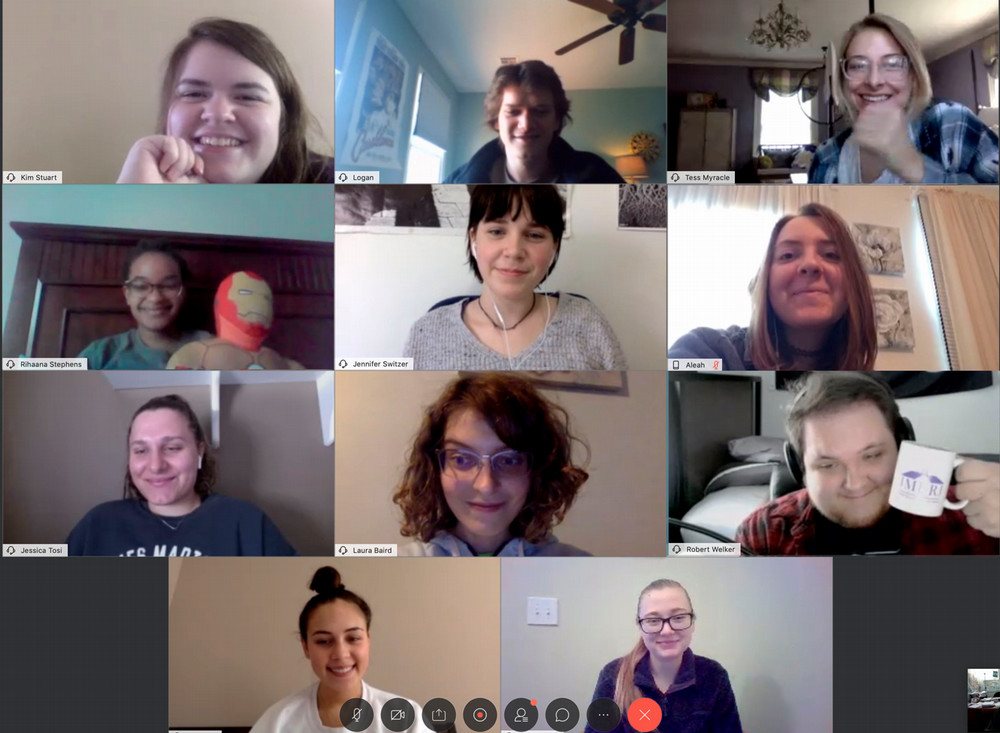Along Came the Board
How an Unobservant WRTC Student Discovered JMURJ
News
by Rihaana Stephens—JMURJ Editorial Board
I should have checked my emails and looked at the bulletin boards in Harrison Hall. I should have talked to my professors. I should have been a proactive student engaged in her JMU community outside of the classroom. But I didn’t do any of those things. That’s why I didn’t find what I’ve been looking for since high school until my last semester at college: an official start to my editing career. The James Madison Undergraduate Research Journal, known as JMURJ, is a peer-reviewed journal that offers JMU undergraduate students in all academic disciplines an outlet for their research and scholarship the chance to publish their research. It also offers students the chance to serve on the editorial board that coordinates the whole effort. That’s where I come in: an incredibly late editor eager to start her career.
 |
||
| Rihaana Stephens |
Just as every superhero has an origin story, so does every editor. Mine is outrageously bland. I Googled how to become an editor about a month before I graduated high school. It told me to go to JMU and major in WRTC. No kidding. Sure, I had my location on, so it gave me the nearest schools, but I like to think it was more fate than a simple algorithm.
I was told multiple times that employers don’t care about high school experience that much, so I spent my freshman year looking for a post-high school editing gig. At first, I thought I could charge people to look over their essays for style and grammar issues. For so many reasons, the answer was no. I think I offered my services to my roommate one time, and she skillfully bargained for a rate of $0 per word. So I followed my millennial instincts and took to the internet. I found a working blog that had glaring typos and stylistic inconsistencies in every article. I offered my services, and they offered me an unpaid internship. I took it.
Come sophomore year, I enrolled in WRTC 300: Professional Editing with Professor Cindy Martin. I learned so much about the craft and the many aspects of editing: it was like an academic chocolate factory for a grammar fanatic like me. Right around that time, the blog let go of me, saying they wanted to make some creative changes to the brand as a whole. I should have seen it coming. The CEO didn’t think a style guide was necessary, and the writers didn’t listen to my suggestions anyway. I thought they needed my services, but it was clear they didn’t want them. Professor Martin always emphasized that we should make our services wanted first. About a week later after the blog rebranded, the first article had a typo in the title, and I earned an A on my final WRTC 300 project.
Junior year hit me harder than Mike Tyson. I spent that fall semester barely hanging on, nearly forgetting why I went to JMU in the first place. One time I saw a grammatical mistake in a final draft of an essay and just hit "submit" anyway. When it was time to enroll in classes for the spring semester, I chose WRTC 454: Publication Management with Dr. Kurt Schick without even reading the description. Two weeks into the class, along came the JMURJ board, helping Dr. Schick plan and deliver our class meeting, talking about the journal, encouraging us to promote, publish, and share JMU undergraduate research and scholarship, and to help make JMURJ publishing history.
Google didn’t mention any JMURJ when I searched how to be an editor, so imagine my delayed excitement at finding out such a thing exists. I felt like Dr. Schick just told me about the Avengers Initiative. I was just minutes away from sneaking JMURJ Managing Editor Logan Roddy my résumé and contact information to ask for immediate admission into WRTC 328: JMURJ practicum when Dr. Schick gave me another editing assignment. Old habits, I guess. This one was different though; it was much harder and open-ended. I didn’t even know where to start
The assignment showed me I wasn’t quite ready: I put too much focus on the document’s minor details and overlooked how I could help the writer improve its bigger picture. Still, I didn’t Google my college career for nothing. I tried my hardest, and I made mistakes. Dr. Schick explained my mistakes and showed me how to fix them. Then he encouraged me to apply for JMURJ.
Now, as I write, I’ve been a part of the JMURJ Editorial Board for a few short months, but I know that it will be an invaluable experience. I’ve screened submissions focused on everything from criminal justice and early twentieth-century warfare to architecture and greedy algorithms. I’ve worked in and between small teams of editors to publish pieces on women's political representation and the aftermath of a city bombing itself. I’ve written on behalf of the JMURJ board in emails to faculty reviewers and student writers. At a deeper level, I've found an accepting, passionate, professional team dedicated to the craft of publication. I am so very pleased to refer to them as my fellow JMURJ Editorial Board members.
Want to learn more about JMURJ and its exceptional team? Check out my forthcoming "Meet the Editorial Board" article, where I ask current board members how they discovered JMURJ, how they have served the journal, and how they see their work on the board informing their future academic and professional careers.
Rihaana Stephens is a senior WRTC major and Russian minor.
